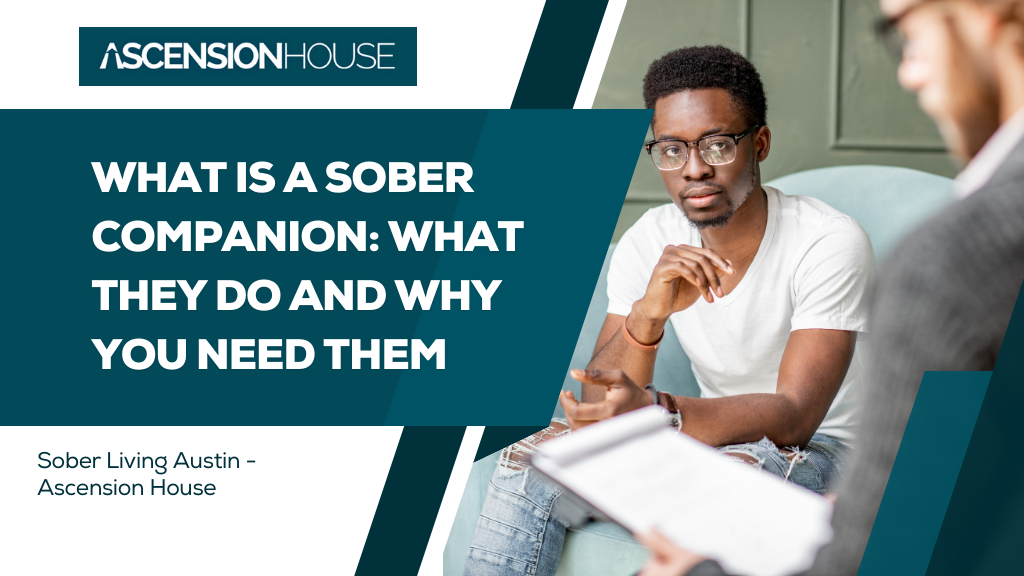
Substance abuse of any kind is a massive thing to battle and beat, and a recovering addict going it alone is far less likely to succeed than one who has a reliable support system in place. One of the best additions to that system is a sober companion.
What is a sober companion? What role do they play in recovery? How do they benefit people battling addiction?
Understanding what sober companions do for those battling addiction helps people better set themselves up for long-term success in their recovery. In this guide, we cover everything you need to know about the types of sober companions, the services they offer, and how they help people get their lives back on track.
Uncover the role and importance of a sober companion.https://t.co/hzltcjt4zD pic.twitter.com/GCg1Cc9qFR
— Ascension House – Sober Living Austin (@AscensionSober) October 16, 2023
What Is a Sober Companion?
In short, a sober companion is 100% dedicated to the recovery of someone battling addiction- usually after they leave a treatment facility or program. They work one-on-one to provide round-the-clock support in whatever way possible.
What Do They Do?
As part of the one-on-one support sober companions provide, their roles and responsibilities may include:
- Going to meetings with the person they support
- Providing resources and materials
- Searching the person’s home for drugs and alcohol
- Accompanying those in recovery to potentially triggering events and places
- Staying with the person for a period of time to provide 24/7 accountability and emotional and physical support
- Setting up routines, habits, and goals to help people adjust back into the real world
- Helping people to regain confidence and clarity as they aim to re-join society
The Different Types of Sober Companions
There are several types of sober companionship services. Each one aims to support people differently, but they ultimately have the same goal- making recovery more manageable and lasting.
Here are the three main categories of sober companionship services.
Short-Term Sober Companionship
Also known as sober escorts on-call sober companions, short-term companions provide support for specific events that could trigger a relapse. They are hired to accompany people briefly- usually by the hour or at a daily rate.
Some examples of when short-term sober companion services may be required include:
- Social gatherings such as weddings and parties
- Business trips and other solo travels
- Weekends (someone to keep them on track on Friday and Saturday nights when temptations may be high)
- Gigs
- Sentimental or difficult dates
- Any other instances where drugs or alcohol may be present, where the person needs a nearby support system dedicated to preventing a relapse
Transitional Sober Companion
Another type of sober companion helps people begin their independent recovery after leaving a treatment facility or inpatient recovery program. They either live with the person for a short period until they feel capable of being alone, or they are simply available to them and actively involved in their life as they adjust to daily life outside of a treatment program.
A transitional sober companion helps set new routines and healthy habits conducive to successful, long-term recovery.
Some examples of how this type of sober companion can help include:
- Bridging the gap between inpatient treatment and at-home recovery
- Helping handle the transition period when moving in or out of a treatment facility
- Setting you up with an actionable plan for how to make your home environment a safe space
- Offering temporary live-in support if needed
Live-In Sober Companion Services
Live-in sober companions are the ultimate solution for those recovering from alcohol or drug dependence who need constant support and guidance. Sometimes, just by being there, live-in sober companions significantly improve a person’s chances of successfully adjusting to their new-found sobriety.
They stay with you to help you implement lasting changes in your lifestyle and put your coping skills into action. Other ways a live-in sober companion assists include:
- Provide physical support by looking for and removing temptations or hidden substances in the home
- Being there around the clock to keep you accountable and helping you say no to alcohol and drug abuse
- Working closely with recovering addicts to create routines and habits that fit in with their real-life
- Seeking treatment and providing other services that can further support a person’s recovery

Why Are Sober Companions Important for the Recovery Journey?
Addiction treatment comes in many forms, but there is much more to recovery than treatment alone. That is where sober companions come in, providing benefits you don’t get elsewhere.
They Provide the Physical and Emotional Support that is Often Lacking for Recovering Addicts
The lack of physical and emotional support is the main factor that holds people back from successful recoveries. Unfortunately, not everyone has family or friends who can provide the support needed to help their loved one through such a challenging time, even if they want to.
A sober companion is 100% dedicated to being the support system that person needs- from being there during the most difficult moments to proactively removing temptations from their homes and lives.
Sober Companions Establish Healthy Routines that Help People Stay Sober
Treatment facilities have strict routines and practices that keep people sober, but what happens when they leave? Sadly, the lack of structure is enough for many people to slide back into old habits. Attending support groups can help, but they are not enough for most people to retain the discipline they need daily.
Sober companions make sure healthy routines and good habits are integral parts of a recovering addict’s life, showing them how to implement them in real life outside of a live-in treatment program.
A Sober Companion Service Takes the Isolation Out of Addiction Treatment and Recovery
Many recovering addicts who relapse say that feeling isolated played a major role, which is one of the main ways sober companionship can make a difference. Especially with a live-in sober companion, you are never alone. Even an on-call or transitional sober companion is always there when you need someone to talk to.
Having a Sober Companion Reduces the Risk of Relapse
Overall, the primary benefit of sober companionship is the significantly reduced risk of relapse. Addiction is complicated to overcome, and your mental health can suffer without your needed support.
Sober companions work to ensure that a person has every resource and opportunity they need to stay sober and clean, and they are 100% dedicated and accountable throughout the recovery journey.



Who Can Be a Sober Companion?
Many sober companions are recovered addicts themselves who have gone through the same journeys as the people they now support. They must be at least five years sober, and it helps to have some certification or credentials as a sober escort.
Not all sober companions have a history of addiction. It is possible to become one if you live a sober life by choice and understand addiction treatment and the rehabilitation program you work with.
In most cases, a sober companion is the same gender as the person they support.
Summary
Having a sober companion is a game-changer in the recovery process. The path to a successful recovery differs for everyone but is very straightforward.
Having somebody dedicated to helping you stay on course who is there whenever you need them could be the thing that gets you there and keeps you on course once you achieve sobriety.
FAQs
A sober companion has many roles designed to make everyday life more manageable for a recovering individual. Some of the things they do include mentoring, setting goals, being there through challenging times, listening to concerns, and providing resources to aid recovery.
In summary, the role of a sober companion is to be the first port of call for the people they work with when they need any support- and to be proactive in helping people overcome challenges, break through barriers, and avoid temptation.
Sober coaches and sober companions do similar work but in different ways. They are both there to support recovering addicts adjusting to sober life, but how and when they operate differs slightly.
Sober coaching is about helping people adjust in the early stages of their recovery journey- identifying potential challenges and sharing practical tips about overcoming them. Sessions are usually phone-based or online, but there are sometimes in-person visits.
Contrastingly, a sober companion is available 24/7 to those who need personal, emotional, and physical support for sobriety in their day-to-day lives.
This service goes beyond the practical elements to provide a deeper support system to help people become long-lasting, positive, productive members of society.
There are no specified federal guidelines on how to become a sober buddy, but it is recommended that the person be at least five years sober and hold the relevant bonds and insurance.
Many sober companions work in partnership with Alcoholics Anonymous groups following the 12-step program, and others operate in connection with treatment facilities, either freelance or as part of the service.
You can get the first national credentials as a certified sober companion through The Addictions Academy. It can help you get into paid positions in this line of work if you start by offering services voluntarily.
By definition, you cannot be sober and take the occasional drink or other substance. Sober life demands complete abstinence from alcohol and drugs, either as a lifestyle choice or as part of an addiction recovery journey.
Even after completing treatment, many recovering addicts choose to remain clean and sober- which is highly recommended to avoid relapses.
Book a Free Assessment
Contact us to schedule a free addiction or mental health assessment as part of our admissions process.
 11700 Bittern Hollow Dr., Austin TX 78758
11700 Bittern Hollow Dr., Austin TX 78758 (512) 598-5030
(512) 598-5030






